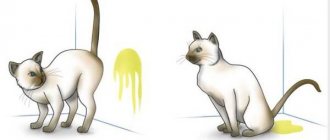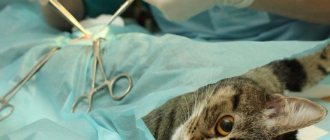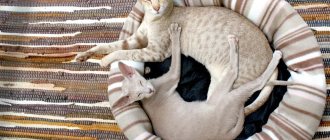12508Administration
Castration is a complex process for both the pet and its owner. After all, it is important that this procedure is quick, easy and painless. How will the cat behave after this operation? A cat's behavior after castration can be unpredictable.
But this does not always happen, sometimes everything remains the same as before the operation. But in order to be prepared for unexpected consequences, it is worth considering the characteristics of the animal’s behavior after castration.
What is castration and why is it needed?
Castration of a cat is a surgical operation during which the testes are removed, which entails the cessation of reproductive function and the production of male hormones. At approximately 7-8 months, cats begin to develop sexual attraction to individuals of the opposite sex, which is manifested in their behavior. Loud screams at night, aggressive behavior, and territory marking begin, resulting in an unpleasant odor in the apartment. Therefore, in order to avoid such behavior, the operation is recommended to be carried out at approximately 7-9 months, when the furry friend is already strong enough, but has not yet experienced all the delights of sexual life. Often, castration is the only way to calm down your beloved pet and make it much calmer and more affectionate.
However, can such an operation negatively affect the health of the pet? And what will the cat’s behavior be like after castration? Veterinarians say that this operation is considered quite simple and is usually carried out without any consequences. However, if you do it to a more mature pet, then anesthesia after castration of the cat can play a role here, since the body of an old animal is much weaker than that of a young one, so there is a risk that any complications will occur during its recovery from anesthesia.
Psychological aspects
Cats are unique and very independent animals. In many ways, their communication with people is based on the principles of mutual trust. A cat goes to its owner only if it completely trusts him. When you take him to a veterinary clinic where the pet could be hurt, trust is broken. What can we say about castration, when an animal undergoes surgery! Of course, his attitude towards the owner may noticeably worsen. Of course, a lot depends on the initial character of your pet. Some immediately after recovering from anesthesia go into their arms, others hide under the sofa, others become aggressive and scratch when trying to pet them. True, cats, despite their vindictiveness, can forgive. But here everything depends on you.
Firstly, do not scold an animal under any circumstances, even if it scratches/bites you. This will only make things worse. Secondly, do not try to impose yourself: if the cat makes it clear by its behavior that it is not happy with your company, it is better to give it its favorite food and leave. Let the pet calm down, after which he will seek your company. What if this doesn’t happen, and you just can’t come to an agreement with the cat?
Then you will have to take the initiative yourself. Talk to your pet more often, give him the most delicious pieces of food from your hands. Gradually, the trusting relationship between you and your pet will return, but this will require a lot of time and your patience.
Pros of cat castration
Veterinarians, in turn, claim that castration of a cat has many advantages and virtually no disadvantages. However, is this really so? We can verify this by listing all the positive and negative aspects of castration. The advantages include that:
- castrated animals often live 1.5-2 years longer;
- the cat stops marking its territory and becomes less aggressive;
- the screams at night and the search for the cat stop;
- the animal becomes very calm and more playful;
- castrated cats practically do not encounter diseases such as adenoma, prostatitis and other infections, unlike animals that have not been castrated;
- the cat becomes more obedient and flexible;
- In cats that were neutered at a young age, mammary tumors practically do not form.
Changes in the behavior of castrated cats.
After the operation, for approximately 2-3 weeks, physiological changes will occur in your cat’s body associated with the removal of the testes.
The body will stop producing sex hormones, the metabolism and the entire body will change.
And most importantly, your pet’s behavior will change as a result of the extinction of the sexual instinct.
At the same time, the cat will not experience any regrets about this, since, unlike humans, the desire to mate is dictated by the instinct for reproduction, and not by a way to get pleasure.
After castration, cats stop marking their territory, yelling at night and trying to run outside in search of a cat. The cat becomes more affectionate, friendly, and shows less aggression.
The average life expectancy of a castrated cat increases by 1.5 times, this is due to the fact that the cat does not experience stress due to the lack of opportunity to mate.
Disadvantages of castration of cats
- After this operation, some pets become lazy and inactive, as a result of which they often suffer from overeating and obesity, since they spend less energy than an uncastrated cat.
- Sometimes cats, after castration, begin to suffer from diseases of the cardiovascular system, and to prevent this, you need to choose the right diet.
- Anesthesia is also a kind of risk for an animal; if for a young cat it is very small, then for an old cat this is quite a big health risk, because some individuals may not tolerate it at all.
- Possible occurrence of urolithiasis.
- Castration, like any surgical intervention, can be accompanied by complications (but these are quite rare cases).
However, many consequences can be avoided if you approach this operation with full responsibility.
Cat after castration: what not to do
It is prohibited to place an animal under the influence of anesthesia near radiators or heaters. An immobilized cat will easily overheat. A pet under the influence of drugs is not able to judge heights, distances, or dimensions of objects and can easily fall.
In the first few days, the purr experiences stress; it will be helped by the friendly attitude of the owners, peace, lack of obsessive attention, and active games. You can't overfeed cats. Gaining weight will create a load on the cardiovascular and musculoskeletal systems, causing shortness of breath, diabetes, etc.
There is a myth, especially popular among male audiences, that a neutered cat feels inferior if he had experience of sexual intercourse before the operation. In fact, the quality and length of a pet's life will only benefit from the loss of sexual instinct.
Do you agree with this statement?
Cat behavior after castration
After this operation, your furry pet will need time to recover. This period usually lasts one or two days, during which the cat is in a relaxed and sedentary state. He may completely refuse to eat, because eating can cause the pet to vomit, move very slowly and unsteadily, all these are the consequences of surgery and anesthesia, so there is no need to worry too much. During this period, it is very important for your furry friend to be supported, given as much attention as possible and shown kindness. You need to carefully monitor your pet, as due to loss of coordination, he may fall from a height and cause any injury to himself. It is worth making sure that the cat does not freeze; to do this, you can cover it with a warm blanket or place it next to a warm radiator. Approximately 5 hours after surgery, you need to give your pet water. Of course, castration of a cat, the pros and cons of which we have examined, greatly depletes the animal.
How quickly does a cat recover after castration?
Castration is performed under general anesthesia; during the operation, the animal is immersed in sleep and does not feel fear or pain. It is recommended to stay in the clinic for the first hour after waking up in case of unexpected reactions of the pet’s body, after which you can return home.
It is useful to take the phone number of the specialist who performed the manipulation so that you can contact him if necessary.
You need to transport your cat home in a carrier, the bottom of which is covered with a disposable diaper or a clean, ironed cloth, which you don’t mind throwing away later. In the cold season, your pet should be covered with a sheet and a warm heating pad should be placed on the back side.
It is better to use a taxi service if you do not have your own car. Now drafts, shaking, and additional stress are contraindicated for the patient.
At home, you need to place the animal on a bedding on the floor, in a warm place (not near heating devices or radiators), and place a bowl of clean water nearby. Anesthesia causes thirst. Motor activity will return 1-2 hours after the end of the operation.
For the first 8-18 hours, the cat is under the influence of narcotic drugs. There is no need to carry out additional procedures to bring him back to his senses; it is enough to ensure peace and security. Full consciousness will return within a day.
Be sure to read:
After sterilization, the cat does not eat or drink for several days: what to do, what to feed
Condition of the animal after surgery
You also need to pay special attention to the presence of stool in the animal. If within three days you notice that he cannot defecate, be sure to show the cat to a veterinarian. The most important thing is to monitor the healing of the postoperative suture. Usually this does not bother animals, but if he starts to crawl into this place and try to lick the wound, then you need to put a special collar on his neck and have the seam treated by a veterinarian as soon as possible. In the postoperative period, it is important to ensure that the suture does not bleed and there is no wetness around it, that the cat’s temperature does not stay above 39 degrees for more than three days and that it does not drop (below 37 degrees).
The nutrition of a castrated cat also needs to be taken very seriously, since after some time the animal’s hormonal levels change. A castrated cat begins to spend less energy, so his body will need fewer calories, and his appetite remains the same. If you monitor your pet's proper nutrition, you can avoid your pet's obesity and urolithiasis.
Caring for a cat after castration on the first day
During the first 24 hours, the behavior of the person operated on will not always be adequate; he may:
- jump up, try to run;
- stagger when walking, fall;
- be in a dormant state;
- experience attacks of nausea, vomiting;
- make successful or not so successful jumps.
There is no appetite, you cannot force feed or water the cat. The body may be very cold to the touch, but within 24 hours blood circulation will be restored and your furry friend will “warm up.”
It is recommended not to leave your pet alone in the apartment on this day and carefully monitor its behavior and condition.
Owners should be alert to:
- shallow rapid breathing;
- heavy bleeding from the wound (a small amount of blood or ichor is considered normal);
- increased heart rate.
If these symptoms occur, you should immediately contact your veterinarian for first aid advice. Under the influence of anesthesia, the cat is poorly aware of the actions being performed with a clouded consciousness; it may try to escape through an open window, window, door, or fall out of the balcony.
It is safest to leave it in transit in a separate closed room until it returns to normal condition.
How to care for your cat in the following days?
Close attention will be needed over the next 5-7 days. It is necessary to monitor changes in the cat’s health status and monitor the healing of the operated groin.
Be sure to read:
How long does it take for a cat to recover from anesthesia after castration: the condition immediately after surgery, which should alert you
Create comfortable, calm conditions for rehabilitation. Limit communication with other animals, small children, if they have the habit of bothering the animal with close attention or squeezing it.
Feeding a neutered cat
The first meal is recommended no earlier than 20 hours after the operation; by this time the appetite is restored, and the cat willingly eats the offered kefir and broth. If an animal refuses food, there is no need to force feed it. The diet in the first 2-3 days should consist of nutritious, light food.
Operated males should not often be given fish containing large amounts of magnesium, phosphorus, and potassium salts. Their accumulation leads to the appearance of phosphate deposits in the urinary canal and kidney stones.
From the industrial range of food, preference is given to the premium class, intended for castrated individuals or marked “prevention of urolithiasis.” They contain substances that oxidize urine. It is necessary to monitor your pet’s weight and not give in to the sad, hungry look begging for treats and additional portions.
Toilet features
Usually, no changes occur after the operation with visiting the tray; an animal accustomed to visiting the “privacy room” continues to do so as usual. In rare cases, heaps and puddles in the wrong places act as an act of protest.
You need to treat the surface with water and vinegar, lemon juice, and a special repellent spray. The first days after castration, you need to pay special attention to the cleanliness of the tray to prevent feces from getting on the wound.
Wound care
Owners need to check the condition of the wound daily. The seams are treated with peroxide solution and ground with brilliant green. You should not prohibit your animal from caring for the affected area on its own; cat saliva contains substances that accelerate skin regeneration.
But if the cat is too active in licking, he is given a special collar. Treatment with Levomekol or Rescuer ointment will speed up wound healing. In the summer, a 5-day course of antibiotics is prescribed to help avoid suppuration and infection of the wound.
Be sure to read:
How to care for a cat after sterilization: blanket, diet, treatment and removal of sutures
When does a cat need pain relief?
The cat will need painkiller injections for a day or two; the statements of some veterinarians that these injections should not be given are a sign of an inhumane attitude towards furry patients. Silence is not a sign of absence of suffering.
During attacks of pain, the cat refuses to eat, lies on its stomach with its paws tucked up, its gaze intense and concentrated, its pupils dilate. He can react aggressively to people when they try to pet him or pick him up.











